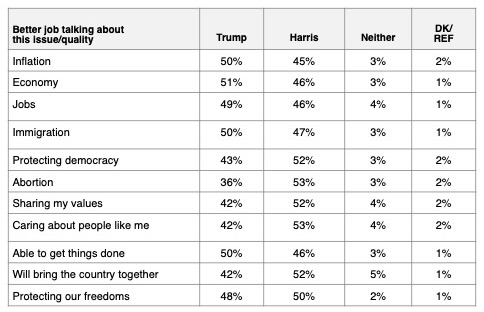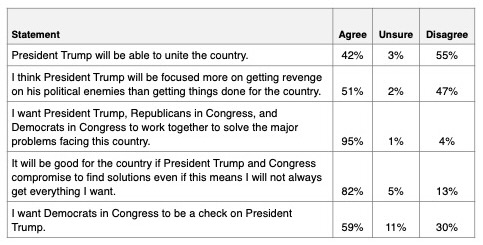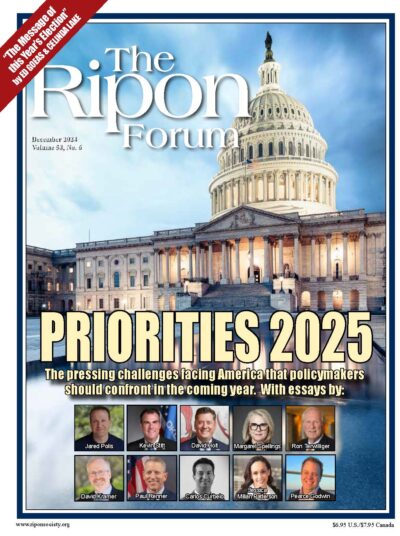
Following the 2024 election, what is the mood of the country and the nature of the mandate? The two of us — a Republican and Democratic pollster — examined this in the latest edition of the Georgetown University Institute of Politics and Public Service national poll on political civility of 800 likely registered voters, which fielded on November 12-14 and November 17. We found that even after a contentious Presidential election, voters still have hope for the future and want their representatives in DC to seek solutions. A fractured media landscape will make these efforts challenging, but voters do clearly want their president and representatives to cooperate to find solutions that will positively impact their families and their communities.
The election was certainly a win for President-elect Trump and the Republicans across the board. But it was also in the end much closer than early reports. It ended up being a very polarized election, with only 4 percent of the voters being double haters (i.e., voters who disapproved of both Trump and Biden) and 67 percent of voters disagreeing that they were picking between the lesser of two evils. While voters were not picking between the lesser of two evils, many would have liked to have had other options. In fact, 59 percent of voters agreed with the statement that they wish there were more viable candidates for president to choose from, including 48 percent of Republicans, 66 percent of Democrats, and 81 percent of Independents.
The election was certainly a win for President-elect Trump and the Republicans across the board. But it was also in the end much closer than early reports.
Voters want change. They also want unity and for their elected leaders to come together to find solutions. Most importantly, they are looking for results that make government work rather than rhetoric that tears us apart. There was a mandate to get the economy fixed, especially among working people, but not to destroy government. In fact, in issue area after issue area, people came down on the side of there being a role for government, including in such areas as raising the minimum wage, preserving Social Security, lowering health care costs and providing affordable coverage, funding education, and protecting jobs through trade interventions. In many of these areas, they favored the Democratic candidates, or at least wanted Trump and the Republican Congress to work with Democrats. Simply put, voters wanted a person in office who could get things done.
At the same time, voters had mixed opinions on the options they were offered. A plurality of voters (48 percent) thought Trump ran a more negative and divisive campaign, while 31 percent of voters thought it was Harris who ran a more negative and divisive campaign. On the positive side, 44 percent of voters thought Harris ran a campaign more focused on hope and the future, while 41 percent of voters thought it was Trump who ran a campaign more focused on hope and the future. Among Republicans, 82 percent thought Trump ran the more hopeful and future-focused campaign. In contrast, 81 percent of Democrats thought it was Harris who ran a campaign more focused on hope and the future. In the end, this was certainly a contentious presidential campaign that was filled with heated rhetoric and tough contrast messaging. However, in the view of most partisans, it was the other side running a negative and divisive campaign, while their candidate focused more on hope and the future. There was no mandate for further division, which is and was a concern people had about President-elect Trump.
Voters were asked to select whether Trump or Harris did a better job of talking about a variety of issues or topics. As seen in the table below, Trump had the advantage on pocketbook issues like inflation, the economy and jobs, and immigration. Harris had the advantage on abortion and protecting democracy, along with leadership qualities like sharing your values and caring about people like me. Trump had a narrow four-point advantage on getting things done, which was close to his margin of victory.

Of the 11 issues and qualities tested, Harris had majority support on six issues and qualities, while Trump had the majority support on four issues and qualities and a plurality support on one issue. However, Trump had the advantage on the key issues of the campaign and what voters most wanted. For many voters, the decisive issue in their vote was which candidate was likely to make their personal economic situation better. Trump had the advantage on these issues, and it clearly served him well at the ballot box.
Looking ahead into the next Congress, voters want collaboration between the parties but have concerns that collaboration will not be a top priority of the Trump Administration.
Looking ahead into the next Congress, voters want collaboration between the parties but have concerns that collaboration will not be a top priority of the Trump Administration. As seen in the table below, most voters do not think that President Trump will be able to unite the country and think that he will be more focused on revenge than collaboration.

The vast majority of voters want all parties to work together to solve problems and favor compromises, even imperfect ones. A majority of voters want Democrats to be a check on President Trump, including 30 percent of Republicans and 28 percent of Trump voters. Trump and the Republicans won the election. But the outcome most voters want is for their representatives in Congress to focus on solving problems and finding common ground. Indeed the DOGE effort may be rhetorically welcomed, but it may also be the most dangerous initiative because of its inherent nature of being divisive in reality. One billionaire businessman’s idea of waste might be a working person’s or Mom’s idea of being a vital investment or safety net.
In fact, an additional question in our survey reinforced this high level of voter interest in compromise and bipartisan solutions. First, given two choices, voters break more than three to one in favor of bipartisan solutions. Seventy-two percent say President Trump and Congressional Republicans should work with Democrats to pass bipartisan laws, even if this means both sides will not get everything they want. On the other hand, only 23 percent said President Trump and Congressional Republicans should stick to their values and only enact policies that they have completely supported, even if that means breaking some old traditions. Even half of Republicans do not choose this option.
The final data in our survey showed that voters across-the-board want solutions, and some think political divisions are improving — driven primarily by Republicans. This is a good opening for President Trump and Congress to work together on solutions and get things done for the American people.
Ed Goeas is president and CEO of The Tarrance Group, a Republican political survey research and strategy team. Celinda Lake, president of Lake Strategies, is a political strategist serving as tactician and senior adviser.




